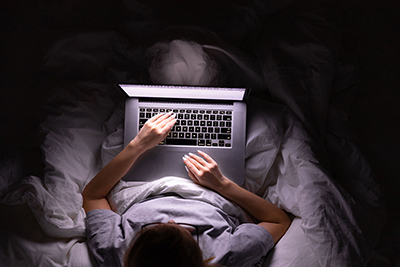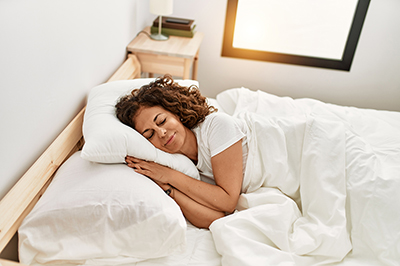Resetting Your Circadian Rhythms
Tick-tock, how’s your clock? To be accurate, your clocks (plural), since they are located in almost every tissue and organ of your body! There is also a master clock, which synchronizes all the clocks. This master clock is housed in the hypothalamus of the brain, and it has the tongue-twisting name of “suprachiasmatic nucleus” or SCN for short. The SCN is the major controller of our circadian rhythms, which are so important to good health.[i]
All our organ and tissue clocks, known as the “peripheral clocks,” have important jobs that keep us running efficiently. Although the SCN is primarily controlled by light,[ii], [iii] not all the peripheral clocks are, and they may instead respond to cues such as eating, moving, and temperature. The peripheral clocks use these cues to regulate the secretion of appropriate amounts of hormones and other bodily fluids; they also adjust our body temperature and influence our genes.[iv]
For most of us, our SCN is controlled by light—or lack thereof—hitting the retina of our eyes (and this applies even when our eyes are closed, since light can be sensed through our eyelids).[v] In blind people, other mechanisms regulate the circadian rhythms. The two main hormones regulated by the SCN are cortisol and melatonin.[vi]
“Long-term consequences of poor circadian rhythms can lead to cancer, heart disease, diabetes, and psychiatric disorders.”
Cortisol is a hormone produced by the adrenal glands. It is probably best known as the “fight-or-flight” hormone that increases in response to stress, but it is also of vital importance to regulating our metabolism. We need cortisol in order to wake up and get going with our day.[vii], [viii]
As the light hitting the retina decreases towards the evening, the level of cortisol drops and melatonin—which is produced by the pineal gland in the brain—increases. Melatonin is necessary for the establishment of good circadian rhythms and, of course, promotes a sound sleep.[ix], [x]
A reversed output of cortisol, where it starts low in the morning, and then becomes high into the evening, delays the surge of melatonin necessary for sleep. This can lead to insomnia, and it makes it more difficult to lose weight, by increasing our blood sugar and our appetite. Elevated cortisol levels also impact our mood, heightening feelings of anxiety and depression. Long-term consequences of poor circadian rhythms can lead to cancer, heart disease, diabetes, and psychiatric disorders.[xi], [xii]
“Melatonin can help you establish healthy circadian rhythms without the side effects or groggy feeling on waking up that many people experience after taking a sleeping pill.”
 How do our circadian rhythms get out of balance? The biggest influence is the use of artificial light during times that are naturally dark. Shift workers are particularly susceptible to the effects of this unnatural light, and this has come to be known as “shift-work disorder.” People who frequently cross time zones and late-night gamers are also prone to disrupting their circadian rhythms.
How do our circadian rhythms get out of balance? The biggest influence is the use of artificial light during times that are naturally dark. Shift workers are particularly susceptible to the effects of this unnatural light, and this has come to be known as “shift-work disorder.” People who frequently cross time zones and late-night gamers are also prone to disrupting their circadian rhythms.
Blue lights, which are found on device screens, can be especially problematic, since blue is of the same wavelength as produced by full daylight, and it tricks the brain into thinking it is still daytime. Exposing the brain to this wavelength late in the day will push the production of melatonin later and means less hours are spent in sleep.[xiii], [xiv]
We often think the answer to insomnia is to take a sleeping pill, or perhaps try nonprescription substances to relax. We might even fall asleep while watching TV, and then wake up the next morning feeling unrefreshed. What if there was a way that actually worked to restore the circadian rhythms and restore sleep? By normalizing these rhythms, you can lose weight and reduce your risk of chronic disease. It is worth a few, easy lifestyle changes!
Take Stock of Your Habits, Adjust Accordingly
First of all, change your habits. Spend as much time outside each day as possible. If natural daylight is impossible due to the time of year, try using a light lamp in the morning for a similar effect. Many people use caffeine to start their day. Drinking a cup or two of coffee or tea before noon may be helpful. More cups than that or drinking caffeinated beverages in the afternoon can interfere with your sleep. If you are tired during the day, a short nap of 20 minutes can help you feel refreshed. At night, dim your devices, and turn them off a few hours before bed. Consider wearing a sleep mask at night and keeping your bedroom cool.[xv], [xvi], [xvii], [xviii]
Vitamin D and B12 Levels
Ask your doctor to check your vitamin D and B12 levels, since these nutrients are correlated with healthy circadian rhythms.[xix], [xx]
Your Day’s Rhythm
Establish regular rhythms to entrain your clocks by keeping waking, sleeping, eating, and moving at the same times each day.[xxi], [xxii]
 Start Taking Melatonin
Start Taking Melatonin
If you have implemented all the lifestyle advice and you are still having trouble getting to sleep on time, ask your doctor if it is alright to use melatonin. Start with a small dose, taken in the hour before bed. Melatonin can help you establish healthy circadian rhythms without the side effects or groggy feeling on waking up that many people experience after taking a sleeping pill.[xxiii]
Every day as you recalibrate your body clocks and prepare them for a restful night, you will experience improved sleep, reset your rhythms, and promote long-term health!
 Wendy Presant, RHNC, CFMP
Wendy Presant, RHNC, CFMP
With a background in nursing, naturopathic, and functional medicine, Wendy Presant is currently registered as a health-and-nutrition counsellor. She provides virtual coaching services to individuals looking to optimize their health.
naturalcoachathome.care
References
[i] Serin, Y., and N.A. Tek. “Effect of circadian rhythm on metabolic processes and the regulation of energy balance.” Annals of Nutrition and Metabolism, Vol. 74, No. 4 (2019): 322–330.
[ii] Blume, C., C. Garbazza, and M. Spitschan. “Effects of light on human circadian rhythms, sleep and mood.” Somnologie, Vol. 23, No. 3 (2019): 147–156.
[iii] Walker, W.H., J.C. Walton, A.C. DeVries, and R.J. Nelson. “Circadian rhythm disruption and mental health.” Translational Psychiatry, Vol. 10 (2020): 28.
[iv] Finger, A.M., and A. Kramer. “Peripheral clocks tick independently of their master.” Genes & Development, Vol. 35, No. 5–6 (2021): 304–306.
[v] Blume, Garbazza, and Spitschan, op. cit.
[vi] Serin and Tek, op. cit.
[vii] ibid.
[viii] Walker et al, op. cit.
[ix] Serin and Tek, op. cit.
[x] Walker et al, op. cit.
[xi] Serin and Tek, op. cit.
[xii] Walker et al, op. cit.
[xiii] Blume, Garbazza, and Spitschan, op. cit.
[xiv] Walker et al, op. cit.
[xv] Blume, Garbazza, and Spitschan, op. cit.
[xvi] Walker et al, op. cit.
[xvii] Dresp‑Langley, B., and A. Hutt. “Digital addiction and sleep.” International Journal of Environmental Research and Public Health, Vol. 19, No. 11 (2022): 6910.
[xviii] Okamoto‑Mizuno, K., and K. Mizuno. “Effects of thermal environment on sleep and circadian rhythm.” Journal of Physiological Anthropology, Vol. 31, No. 1 (2012): 14.
[xix] Radleberger, R.F., and A.B. Kunz. “Vitamin D deficiency promoting non‑24 hr sleep-wake disorder: A case report.” Frontiers in Neurology, Secondary Sleep Disorders, Vol. 14 (2023): 1141835.
[xx] Okawa, M., K. Mishima, and Y. Hishikawa. “Vitamin B12 treatment for sleep-wake rhythm disorders.” Sleep, Vol. 13, No. 1 (1990): 15–23.
[xxi] Christensen, S., Y. Huang, O.J. Walch, and D.B. Forger. “Optimal adjustment of the human circadian clock in the real world.” PLoS Computational Biology, Vol. 16, No. 12 (2020): e1008445.
[xxii] Kalkanis, A., S. Demolder, D. Papadopoulos, D. Testelmans, and B. Buyse. “Recovery from shift work.” Frontiers in Neurology, Vol. 14 (2023): 1270043.
[xxiii] ibid.

 Stores
Stores